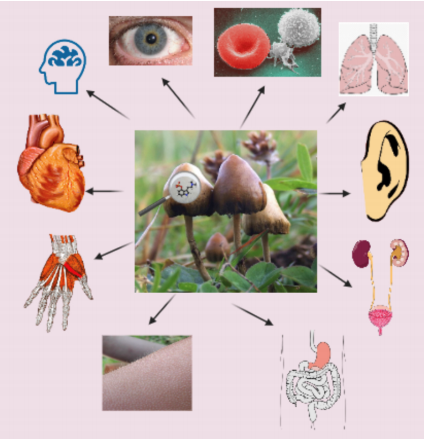CBD, Magic Mushrooms, Psilocybin, Psychedelics
🍄 How Mushrooms Interact with the Body’s Natural Systems
Exploring the Powerful Synergy Between Functional Fungi and Human Physiology
In recent years, functional mushrooms have emerged as nature’s quiet superstars—supporting everything from brain health and immunity to stress management and energy. But how exactly do mushrooms interact with the human body? What makes them more than just a health food trend?
The answer lies in their unique chemistry and their ability to communicate with the body’s natural systems—from the immune network and nervous system to the gut and endocrine system.
Let’s dive into how functional mushrooms work on a physiological level and why their synergy with the body makes them such powerful daily wellness allies.
🌿 The Bioactive Compounds That Make Mushrooms So Special
Before we explore how mushrooms interact with our internal systems, it’s essential to understand what gives them their power.
Functional mushrooms contain a wide range of bioactive compounds, including:
- Beta-glucans: Immune-modulating polysaccharides
- Triterpenoids: Anti-inflammatory and liver-supportive compounds
- Erinacines & hericenones (in Lion’s Mane): Stimulate nerve growth factor (NGF)
- Cordycepin (in Cordyceps): Boosts cellular energy production
- Polyphenols & antioxidants: Help combat oxidative stress
- Prebiotic fibers: Support a healthy gut microbiome
These compounds don’t work in isolation—they interact with the body in multi-layered, system-wide ways, making mushrooms uniquely holistic in their effects.
🛡️ 1. Mushrooms and the Immune System
The immune system is perhaps the most well-known area where mushrooms shine. Functional mushrooms like Turkey Tail, Chaga, and Reishi contain beta-glucans, which have been extensively studied for their ability to modulate immune response.
How it works:
Beta-glucans bind to immune cells (like macrophages, dendritic cells, and natural killer cells) and activate or regulate their response. Rather than overstimulating immunity, mushrooms help bring the immune system into balance—making them useful in both low immunity and autoimmune conditions (with supervision).
Example:
- Turkey Tail has shown promise in supporting immune function during cancer recovery
- Chaga is rich in antioxidants that help reduce oxidative inflammation
🧠 2. Mushrooms and the Nervous System
Some functional mushrooms, particularly Lion’s Mane, directly affect the central nervous system and brain function.
Lion’s Mane contains hericenones and erinacines, compounds that stimulate the synthesis of Nerve Growth Factor (NGF). NGF is crucial for the growth, repair, and protection of neurons.
What this means:
- May improve cognitive performance and memory
- Supports neuroplasticity—the brain’s ability to rewire and adapt
- May help prevent or slow neurodegenerative disorders like Alzheimer’s or Parkinson’s (early-stage research)
Bonus: Many people report enhanced focus, creativity, and reduced brain fog after regular use.
🩸 3. Mushrooms and the Endocrine (Hormonal) System
Mushrooms like Reishi and Cordyceps interact with the hypothalamic-pituitary-adrenal (HPA) axis, the body’s primary stress response system.
What happens:
- Reishi helps calm the nervous system, lower cortisol levels, and support better sleep
- Cordyceps supports adrenal function and improves cellular energy (ATP), which helps fight fatigue and burnout
These actions are classified as adaptogenic, meaning the mushrooms help the body adapt to stress and bring internal systems into equilibrium.
This is why many athletes, entrepreneurs, and wellness seekers use functional mushrooms for sustained energy without stimulants.
🦠 4. Mushrooms and the Gut Microbiome
The gut is home to trillions of bacteria that play key roles in digestion, immunity, and even mood. Functional mushrooms contain prebiotic fibers and complex polysaccharides that feed beneficial gut bacteria.
Why it matters:
- A healthy microbiome supports better digestion, nutrient absorption, and immunity
- Gut health is deeply connected to mental health through the gut-brain axis
- Turkey Tail in particular is rich in prebiotics like PSK and PSP, which have shown positive effects on microbiome diversity
This makes mushrooms a quiet but powerful ally for long-term digestive and immune resilience.
⚖️ 5. Mushrooms and the Inflammatory Response
Chronic inflammation is linked to nearly every major disease, from heart issues to diabetes to brain decline. Mushrooms help regulate inflammation at the cellular and systemic levels.
- Chaga and Reishi are especially rich in antioxidants and anti-inflammatory triterpenoids
- Cordyceps helps modulate cytokines—proteins that control inflammation
Regular use may help reduce systemic inflammation, protect organs, and support overall longevity.
🔁 A System-Wide Synergy
Unlike many single-compound pharmaceuticals, mushrooms contain a broad spectrum of compounds that act across systems—immune, endocrine, digestive, neurological, and cardiovascular.
Their power comes not just from what they do, but how they help your body do what it’s designed to do—better.
They support balance, resilience, and regeneration rather than override natural functions. This makes them ideal for:
- Daily wellness
- Stress recovery
- Immune maintenance
- Cognitive support
- Aging and vitality
🧭 Final Thoughts
Functional mushrooms are more than supplements—they’re biological communicators that work in tune with your body’s rhythms and repair systems. From brain to gut, from stress to sleep, they offer a gentle yet powerful way to support whole-body wellness.
When taken consistently and mindfully, these adaptogenic fungi can help your body not just survive—but thrive.

